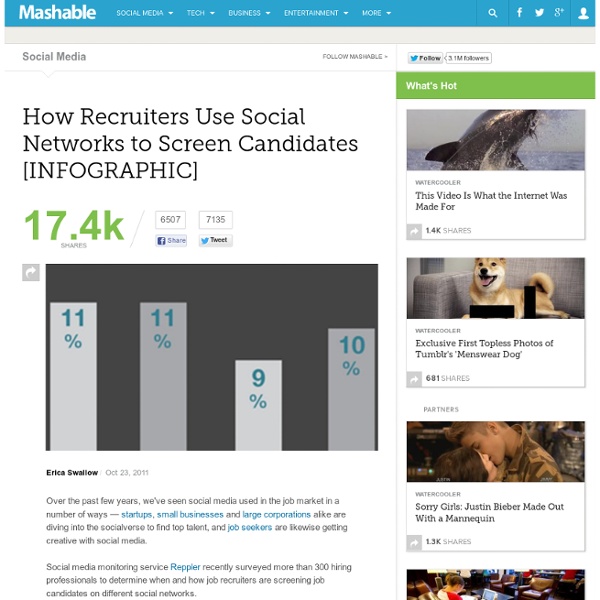Social media attracts London's job seekers
Forty three per cent of Londoners use social media to look for jobs, new research from LondonlovesJobs.com has found. The survey also found that 30 per cent of business leaders are especially likely to use LinkedIn when hunting for a new position. The technological evolution of the internet has altered how we behave in many ways and it looks like job seeking is no different. To find out more about Londoners’ job seeking habits why not check out LondonlovesJobs.com’s nifty infographic. It appears that men are far more likely to use LinkedIn than their female peers with 30 per cent of males citing the social media as a viable job hunting option versus only 18 per cent of females. The survey carried out by the new jobs board showed that while the way in which people search for roles is changing dramatically, employers have been slow to adopt these new modes.
5 Ways Social Media Is Revolutionizing Talent Acquisition
Sajjad Masud is co-founder & CEO of Simplicant, a cloud-based social recruiting platform transforming talent acquisition and making enterprise-level recruiting technology accessible to companies of all sizes. Connect with Sajjad and the Simplicant team on Twitter and Facebook. The way we communicate with each other has evolved rapidly over the last decade. Social media has further intensified the departure from traditional communication methods to redefine how people and businesses interact with each other.
How Companies Use Facebook To Hire And Fire Employees (INFOGRAPHIC)
In an increasingly digitized world, roughly 45 percent of employers now reportedly use social media sites like Facebook, LinkedIn, and Twitter to screen potential employees, according to Mindflash.com. Not all Facebook-related employment decisions are necessarily negative, as Mindflash.com depicts in the below infographic. Indeed, 18 percent of employers have found information that has actually facilitated their decision to hire a job applicant. Still, finding something unsettling is more common, as more employers used what they found on social networking sites to bar applicants from employment. Of those surveyed, 35 percent of employers were reported to have found content that cause them not to hire a candidate for an open position. More than ever, already-hired employees are paying careful attention to what is on their Facebook.
Social Recruiting On The Rise In 2011
Results from the 2011 Social Recruiting Survey conducted by Jobvite indicate that the use of social media and social networks for recruiting continues to increase among employers and their efforts are paying off! Almost 2/3 of respondents indicated that they have successfully hired a candidate via their social recruiting efforts within the last year. The Jobvite survey includes responses from over 800 employers in the US, and now in it’s 3rd year, provides a good benchmark for social recruiting growth. The survey also indicates that many employers are expanding their use of social networks for recruiting beyond LinkedIn, with 64% of employers indicating that they use two or more social networks for recruiting in 2011. The survey results reveal that a majority of employers expect to increase hiring over the next 12 months and 77% expect increased competition for talent as the economy heats up. As a result, many are increasing their budgets for recruiting via social media in 2011.
No More Résumés, Say Some Firms
How your Facebook status could put you out of work
Employers often have a social media policy in your contract, strengthening their position in a tribunal. Photograph: Joerg Koch/AP Thinking of badmouthing your employer or work colleagues on a social networking site? After the case of the Apple employee, whose dismissal for doing just that was this week upheld by an employment tribunal, you'd be well advised to think again. On the face of it, social networking outlets such as Facebook and Twitter might appear to offer people an arena for venting their spleen on any issues, including gripes and grievances about work.
12 Awesome LinkedIn Infographics in 2011
UK tribunal upholds Apple's firing of retail employee for critical Facebook post
By Josh Ong A British Employment Tribunal has upheld Apple's decision to dismiss a retail store employee who violated company policy by posting derogatory comments about his employer on the Facebook social networking site. The employee, named Crisp, lodged a complaint with the tribunal after he was fired for gross misconduct when negative posts to a private Facebook page were passed along to the Apple Store manager by a coworker. Though Crisp had argued that the dismissal was unfair because the messages were private, the tribunal decided that the communication was not protected because friends could have easily copied and shared it.
Safe social networking
While most people who use social networking sites are well intentioned, you need to be careful about the information that you share and how you protect it. People can inadvertently or intentionally use your information to embarrass you or damage your reputation, or to even steal your identity. Social networking sites such as MySpace, Facebook, Twitter and Linkedin are used to stay in touch with friends, make new friends or business connections and to share information and opinions about topics we're interested in. You need to think about how much information you provide and to whom. Top tips
Employers, Get Outta My Facebook
Pro: Web Profiles Aren’t Résumés by Greg Fish Imagine posting a picture of yourself in a Halloween costume on your MySpace (NWS) or Facebook profile at the risk of killing your career.
Use Facebook for Recruiting



